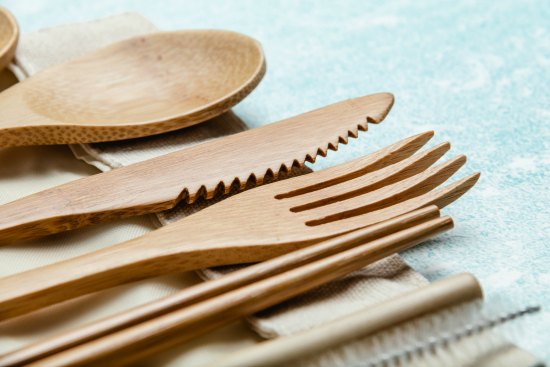Because of bamboo’s quick growth and reproduction, it is deemed one of the most sustainable resources we can use. Bamboo can be incorporated into your everyday life too in order to help reduce your impact on the planet.
While bamboo is hard like wood, it is really a grass that self-regenerates from its own root. This means it does not need to be replanted once it gets started. As well, it is easy to care for and requires no fertilizer, is not labor-intensive, and does not require large amounts of water to regrow. In fact, there are many brands that are starting to promote the eco-friendly benefits and sustainability of bamboo and it’s easy to see why.
According to one website, “Bamboo takes about three years to get established. Once established the new shoots that emerge in the Spring (they will still only grow for 60 days) will continue to get bigger and more numerous from year to year as the colony grows towards maturity.” Other websites state it would take as little as ten years to grow a sustainable bamboo forest.
Bamboo is also able to regrow from its own roots so it won’t need to be replanted and it doesn’t require fertilizer to flourish. When compared to cotton cultivation, which requires large amounts of water, pesticides, and labor, the advantages of choosing bamboo are pretty clear.
But the downside is that most bamboo is currently grown in China. There is no information regarding how intensively the bamboo is being harvested in China and it still isn’t known what sort of land clearing might be underway in order to make way for the bamboo. Something else to keep in mind is that although bamboo doesn’t need pesticides, there is no guarantee that they are not being used to help maximize the amount produced.
The one way in which bamboo may not be all that sustainable is when it’s transformed into fabrics. This is a labor-intensive process that requires a lot of chemicals. It takes a lot of time and resources to soften bamboo just like anything else, but you don’t have to wear it! There are many other ways to introduce this gorgeous material into your life!
Here are 10 Sustainable Ways You Could Use Bamboo

If you are interested in working with bamboo, start on some small projects before you go big. Small projects will teach you how to work with bamboo and learn the way the wood feels and how to even bend it.
- Furniture – Making furniture is a sustainable way to use bamboo. There are all kinds of chairs and tables made from bamboo and they look incredible! Try using bamboo instead of wood for your next furniture craft!
- Support structures for livestock – Bamboo makes strong fencing for livestock containment. Here’s a video on the subject.
- Trellis for garden – this is a really inexpensive way for you to buy (or create) something gorgeous for your plants to grow on.
- Utensils (spoons, forks, knives, cups – even straws) – Utensils can be harder to make out of bamboo, but it can be done!
- Flower Planters – Due to bamboos durability, it makes the perfect long-lasting flower planters. Check out this video on how to make them.
- Needles for knitting – while it could be fun to try to make these, they are pretty inexpensive, so it might be worth it to buy some already made.
- Toothbrush – Did you know that bamboo toothbrushes are naturally antimicrobial? They can also be composted like all of the other bamboo products, provided there are no chemicals or paint used! Try it yourself!
- Musical instruments – That’s right. You can make an authentic bamboo flute and lay your favorite music with.
- Food – you can even learn how to harvest bamboo shoots and cook them just like the Japanese do!
- Beer – Not only can you use bamboo to make a beer mug (below) or coffee cup, but you can make beer out of it too!
If you are interested in continuing your sustainability journey with bamboo, click here to see 21 more ways it can be used; and all are DIY!
Bamboo is a more sustainable way to create one of a kind items that you’ll use, love to make, and be able to compost when their time is up. This creates a much more eco-friendly environment! And who wouldn’t be happy to surround themselves with such a beautiful and natural material as bamboo!
This article was originally published at Ready Nutrition™ on May 9th, 2020








